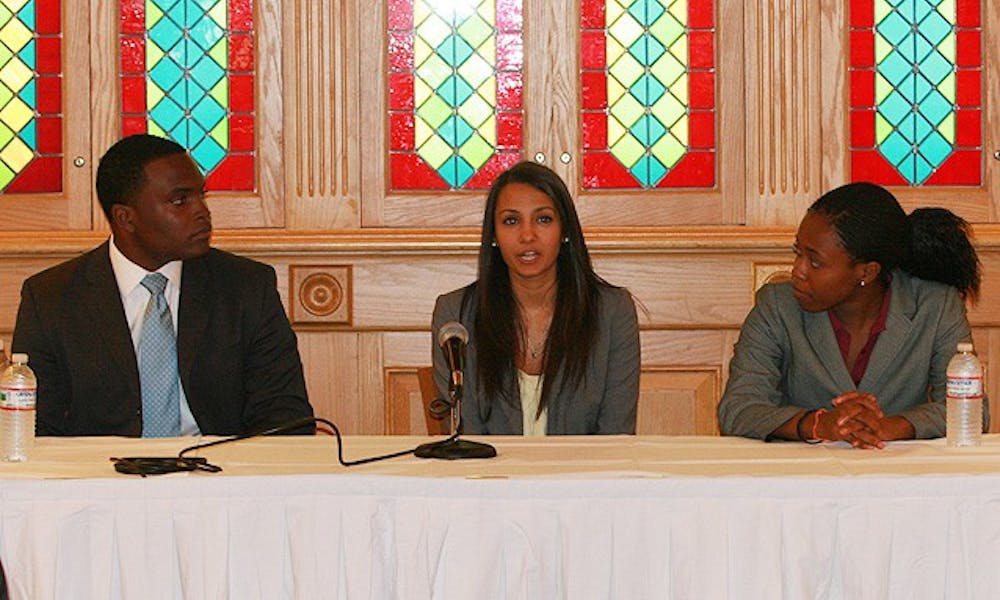More than 70 students packed into a room in the West Union Building last night for the fourth annual “Minorities on Wall Street” event.
The gathering consisted of a panel of three students who had internships on Wall Street last summer, a panel of investment banking professionals and a networking session.
Students explained the technical differences between sales and trading, investment banking and research before sharing “war stories” from internship interviews.
Junior Esosa Osa described one interview in which the recruiter asked her to do complex math on the spot.
“The square root of 16,000—are you kidding me?” Osa said. “The lady was just grilling me. When I figured it out, she was like, ‘You should have done it faster.’”
Finance is a popular career path among Duke graduates, with firms like Goldman Sachs and Morgan Stanley some of the top five biggest employers in recent years, according to Career Center exit surveys from 2008 to 2010.
Approximately 30 percent of last year’s graduating class took finance-related jobs, said Kristen Nicholas, associate director for external relations for the Career Center.
But the competition for finance jobs is fierce, said junior Pavithra Mahesh.
“It’s a very competitive process, but going to Duke where a lot of companies recruit, if you really want it just be aggressive,” Mahesh said.
Banks on Wall Street are increasing their efforts to recruit diverse students, often times with the help of faculty such as Emma Rasiel, associate professor of the practice of economics. When Rasiel started the Financial Education Partnership, one of her goals was to provide more opportunities for minorities to learn more about financial markets.
“There’s an information gap between Wall Street, who would like a more diverse work force, and underrepresented groups who don’t know anything about Wall Street and are therefore not following that path,” Rasiel said. “But at Duke, the number of underrepresented minorities that go to Wall Street has been increasing the last three or four years.”
Mayowa Ajayi, a panelist representing Barclays Capital, called Rasiel a “point person” for firms that seek to attract diversity.
“If you want to attract minority candidates, Emma Rasiel is the focal point,” Ajayi said. “She’s the person people know at firms to attract diversity. She’s been great creating collaboration between firms and diversity groups like women’s groups, et cetera.”
Firms are using new methods to diversify their workforces, said junior Reuben Ogbonna, who worked at J.P. Morgan this summer.
“Pretty much every major bank on Wall Street has a diversity recruiting program now,” Ogbonna said. “That certainly wasn’t the case five, 10 years ago.”
Firms are also paying closer attention to underrepresented groups such as women, the disabled and members of the lesbian, gay bisexual and transgender community, he added.
Kurt Engleman, Trinity ’01 and an employee at Capital One, said in finance, there is value in increasing the diversity of the workforce, not only with respect to race but also with experiences.
Students of all years attended the event, including English major Brea Davenport, a junior who became interested in finance after taking an accounting class over the summer.
“I didn’t even know what [investment banking] was until I came here and there are all these panels with people from this bank and [that] bank,” she said. “It’s everywhere. You found out there are lots of perks, and I guess you make a lot of money. There also seems to be this intense camaraderie of people and a crazy work atmosphere, which I like.”
Get The Chronicle straight to your inbox
Signup for our weekly newsletter. Cancel at any time.

